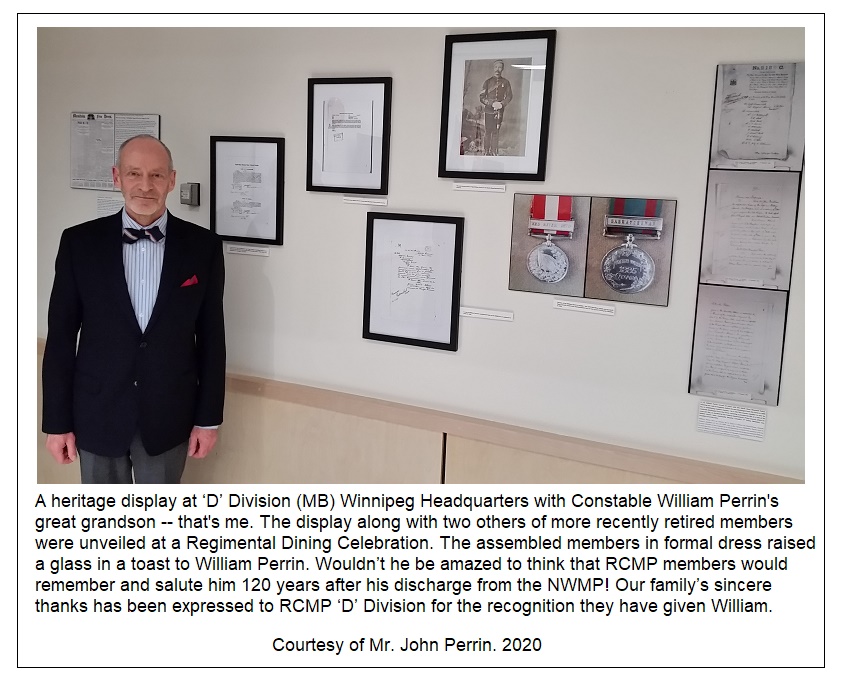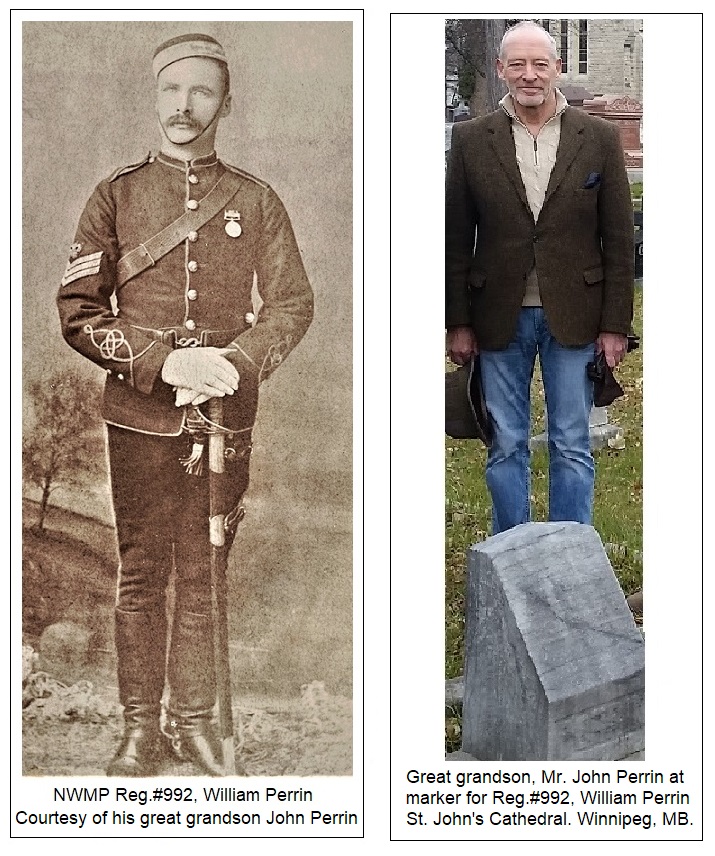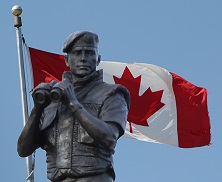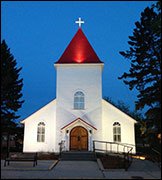True and Fascinating Canadian History
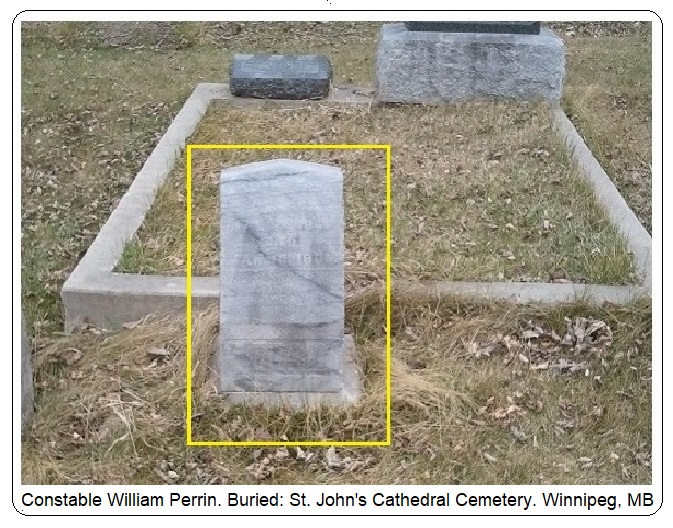
Vet of the Month: July, 2020
Reg.#992, NWMP Constable William Perrin
RCMP Vets. Ottawa, ON
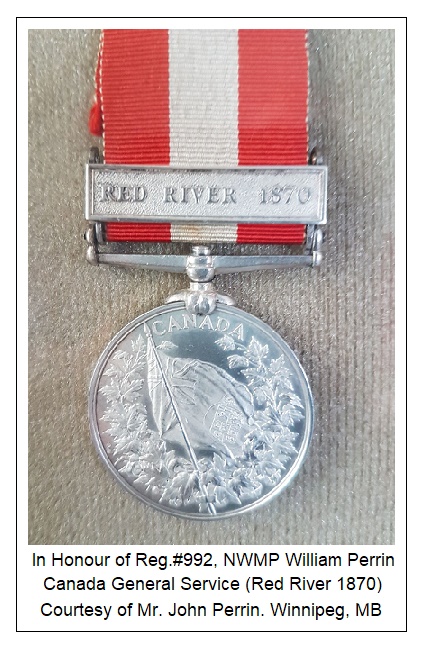
I am very appreciative to my friend Mr. John Perrin now living in Winnipeg, MB who so graciously helped me with the research and the photos of his great grandfather North West Mounted Police (NWMP) Constable William Perrin.
Born in Dublin, Ireland in November 1884, William Perrin arrived in Canada from Malta aboard the HMS Himalaya in 1867. His engagement with the Wolseley Expedition and its harsh living conditions may have contributed to his declining health over subsequent years, and the stress on his body while he was a member of the NWMP and fighting in the North West Rebellion might have all contributed to his early death.
As a young man, Perrin joined the 1st Battalion, King’s Royal Rifles Corps as a British soldier. According to Mr. John Perrin, the Battalion was later placed under the command of Col. Garnet Wolseley and formed part of the Red River Imperial Expeditionary Force from June to September 1870. The on-line encyclopedia Wikipedia explained the Expedition's purpose, Wikipedia said, "The Wolseley expedition was a military force authorized by Sir John A. Macdonald to confront Louis Riel and the Métis in 1870, during the Red River Resistance, at the Red River Colony in what is now the Canadian province of Manitoba." (p.1). Looking back, it seems that little consideration was given by the Expedition's planners for the physical suffering which the men would experience on the Expedition's trail.
The Expeditionary Force travelled from Lake Superior arriving at Upper Fort Garry in August 1870. Contemporary historians claim the Expedition is considered to have been among the most arduous in history. Speaking of untold difficulties, Wikipedia said, "Over 1000 men had to transport all their provisions and weaponry, including cannon, over hundreds of miles of wilderness. At numerous portages, corduroy roads had to be constructed. As these jobs were being done the troops had to endure life in the bush for over two months, in summer heat and the inevitable plagues of blackflies and mosquitoes." (Wikipedia. p.1). To his credit, William Perrin was present and fully engaged in the arduous activities of the Expedition. To what degree William Perrin's health suffered as a result of the Expedition's travails is not precisely known, but it is known that years later his eventual career with the NWMP was cut short due to a host of health issues.

Interestingly, as one of the original members of the Expedition, William Perrin provided an eyewitness account of the Expedition's arrival at Upper Fort Garry. His story appeared in the Manitoba Free Press in August 1900 -- the 30th Anniversary of the Expedition's arrival at Fort Garry.
It was after his exploits with the Wolseley Expeditionary Force, that William Perrin joined the NWMP. It was January 22, 1884. Over five years, Constable Perrin was posted to Medicine Hat, then to Swift Current, Regina and Maple Creek. His career ended at 'Depot' Division in Regina, SK. History has also recorded that William Perrin was posted at Battleford when the North West Rebellion broke out and on June 2, 1885 he was also present at the Battle of Cut Knife Hill. By 1889, William Perrin's health had been sacrificed and his attention turned to the probability of a medical release from the NWMP.
According to Mr. John Perrin, his great grandfather William Perrin was discharged from the NWMP for medical reasons in June, 1899. William Perrin is distinguished from many other NWMP because he was the first member of the Force ever to receive a disability pension (in the amount of 25 cents per day). The pension was requested in a petition to the Privy Council in Ottawa from Sir Hugh John Macdonald and it was only granted to a select few other Veterans of the Wolseley Expedition!
Sadly, William died as a result of his illness in 1906 at the age of 59, leaving his wife with four children ages 15 to 8 at home. John Perrin added, "The meager pension, of course, carried no survivor benefits!"
Mr. Perrin concluded his story about his great grandfather by saying, "Our family remain in possession of the Canada General Service Medal (Red River 1870), and the North West Canada Medal (Saskatchewan 1885). I also have what we believe was his Adams patent 2097 revolver, although not sure whether it was army or police issue?
Reporting from Fort Healy,
J. J. Healy
July 23, 2020
